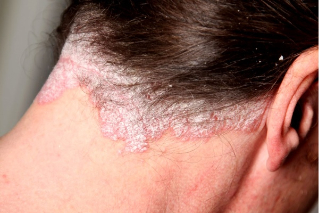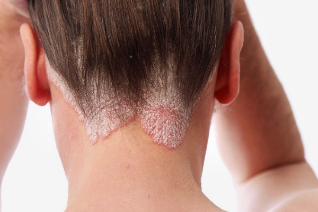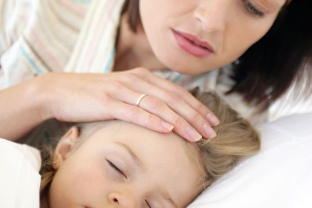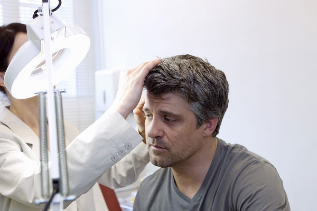Psoriasis is a skin infectious disease that occurs in 1 out of 100 people, and 80% of the cases revealed loss of the scalp. It leads to the formation of red tiles or dots, between which is visible to the intact skin. The inflammation may extend and connect to each other. Why psoriasis and cure, find out below.
A brief summary of the pathology

Psoriasis is an autoimmune disease. This led to the decision the doctors had made after the examinations boards, they showed a feature of autoimmune diseases changes, and treatment that suppress the immune system drugs significantly improves the general condition. The disease is not contagious sick, healthy people.
Psoriasis can affect anyone, but clinical experience allows to identify the main risk groups. So, often, the disease affects women, genetically inherited form makes itself felt already in 15-25 years. Cases more than 50% of cases have relatives with psoriasis in one form or another. This means that the risk of such disorders is higher among those whose parents, brothers or sisters, also have this kind of diagnosis. Psoriasis of the scalp, as a rule, can hit the following sites:
- partings;
- the upper part of the forehead;
- behind the ears;
- whiskey;
- the back of the head;
- the skin of the ears, including the ears;
- the arches of the eyebrows.
Typically, such a psoriasis is a wave-like nature of the flow, which is associated with alternating improvement and aggravation stages. When the affected areas appear red teardrop-shaped plaques of fatty content, which is regularly sloughed off and cause itching. This inflammatory process leads to serious health consequences, but it becomes a cause of serious psychological problems. Very often there is a vicious circle, in which psoriasis causes stress, and she, in turn, cause complications the occurrence of pathology.
The disease itself does not cause hair loss, however temporary hair loss can lead to some of the methods of treatment, stress or injury to the skin. Usually the hair will grow back after the cleaning and stabilization of psychoemotional state.
Why is there?

Doctors have not yet identified the exact causes that trigger the inflammatory response and the excessive synthesis of the skin cells of the patient's body. At this stage the leading hypothesis is genetic. It States that individuals have a natural tendency to fast-track the renewal of the keratinocytes (the main cells of the skin human skin). Manifestation of psoriasis such tends to cause a certain reaction of the immune system:
- The body begins to rapidly produce new cells that form psoriasis patches.
- More serious inflammation of the skin in the affected area (the body treats it as something alien).
- The more damaged the skin under the influence of the immune system, the more active is the division keratinocytes.
For a long time, genetic factors may remain latent, but he wakes up under the influence of harmful factors. These are:
- Stress. Changes in the nervous system causes a disruption of the functioning of all organs, including the skin. In the end, this leads to changes in the distribution of epithelial cells.
- Often trauma to the skin. They cause failures in the process of division and growth of keratinocytes.
- Infectious diseases. The bacteria attack the human immune system, especially if the disease is chronic. As a result, the immune system is constantly in tension and begin to attack the epithelial cells.
- Dryness and skin sensitivity. In this case, the skin is often traumatized, therefore, likely to develop psoriasis.
- Climatic conditions. When dry and cold air, the skin will experience increased load, therefore, the possible violations that lead to psoriasis.
- Diseases of the endocrine system. They cause disturbances in the development of melatonin and cause increased secretion of growth hormone.
Another popular hypothesis says that psoriasis develops due to violations of metabolism. In this case, the body specifically reacts to stimuli rapidly dividing cells of the dermis. Normally, the skin must be renewed after 3 weeks, the patients it occurs within 5 days, when the head is numerous tiles. In this case, the cause of exacerbation may be the following factors:
- damage the scalp;
- emotional stress and stress;
- hormonal disorders;
- diseases of the endocrine system;
- bad habits (Smoking, alcohol abuse);
- infectious processes in the body;
- the wrong diet;
- use of certain medications;
- hypothermia, or prolonged exposure to the cold;
- the use of poor-quality care products of the scalp.
In some cases, the starting point for the development of psoriasis can be pathology of the immune system, which can occur as a result of severe stress or infectious disease.
It turned out that HIV-positive suffering from psoriasis for 3 times more often than healthy people.
Because the disease is shown?
Psoriasis develops slowly, and it is possible to identify the different stages of the following processes:
- The surface of the skin appear pink rash, which is rounded, and the top covered with numerous plaques in white.
- The lesions gradually grow and increase in diameter. Eventually, they turn into thickened psoriatic plaques, which causes itching and burning. After this, a strong inflammatory process.
- Tissue growth to unduly pressure the excessive reproduction of ectodermal cells in the plaques and excessive accumulation of lymphocytes and macrophages. This leads to thickening of the skin of the affected areas and the formation of red spots in the field of hair growth.
- The patient has malaise and weakness. He could jump from body heat.
- The skin becomes sensitive, painful and more dense. Gradually, it loses its elasticity, becomes rough, and it is covered with plaques which flakes quickly.
- When combing the scalp is covered with blood, scratches and cracks.
- Plaques gradually shed, so the hair you see massive layers, which resemble dandruff.
- The itch gets harder and not even let the person do the usual things.
- A person is depressed or constantly broke, feeling great aesthetic discomfort.
- The pathology is distributed throughout the scalp and other parts of the body.
To minimize the symptoms of psoriasis is required when first damage from contact a dermatologist to be examined and start treatment.
Features symptoms in children

Psoriasis of the scalp, the child develops almost in the same way as adults, but most often, the disease spread with such symptoms:
- redness of the scalp, which is seen even through your hair;
- the wet softening of the skin, which in medicine is called maceration;
- flaking of plaques;
- the formation of clusters of plaques in certain areas of the scalp.
The younger age group psoriasis often resembles a formation of diaper rash. The disease develops very slowly and is difficult to treat.
Classification pathology
Psoriasis scalp is classified by two parameters - shape and stage of development. It depends on them, what looks like a disease. Each parameter is considered individually.
Form
Form of psoriasis is of two types:
- Easy. Mainly manifested in the head in the form of one damage. Typically, the plaques are small and covered with thin tiles.
- Heavy. Psoriatic elements appear throughout the scalp. The size of the plaque and more and thickness as the mild severity of the disease.
Step
Experts identify three degrees of pathology:
- Progressive. Scalp new lesions. They usually affect the area of the contour of the hair growth. For psoriatic elements, is peeling. Gradually, the Islands of the rash may merge, forming extensive damage. If the step occurs during the recurrence of the disease, which is already available elements distributed on the circumference, what is called the phenomenon of kebne your.
- In place. The inflammatory process remains, but no new rash. This stage is characterized by the blunting of growth and a sign of the absence of a hyperemic rim along the contour of the skin elements.
- Regressive. Reduced the amount of damage, which demonstrates the effectiveness of the treatment. Gradually disappear the existing plaques, which are replaced by liver spots. The patient no longer worried about peeling, itching and other symptoms of pathology.
Diagnosis

If there was a rash on the scalp, you need to consult a dermatologist. In addition, it may consult with a specialist hair care (official), and beautician, who will help you choose the shampoos and other treatment. Diagnosis of the disease is a big role in identifying the psoriatic triad, which consists of such phenomena as:
- Stearic spots. Enhanced scaling and plaque is silver in color and resemble stearin.
- Psoriatic arthritis in the film. If you remove the plaque, and in their place appeared a shiny wet surface.
- Blood baptism. When combing plaques appear on the drip point of bleeding.
These symptoms, to diagnosis already eye. The doctor will take into account the information history, including whether the patient's relatives with psoriasis. To confirm the diagnosis, your doctor may prescribe a biopsy (the biopsy material from the affected areas) and planting flora to rule out a fungal infection. If the generalized forms of psoriasis is still a General analysis of blood. During intoxication it will show a high erythrocyte sedimentation rate (ESR), and elevated white blood cell count.
General medicine
Psoriasis of the scalp requires an individual treatment that helps to relieve the unpleasant symptoms, and most importantly - to achieve long-term remission of any form of pathology. For these purposes, often appointed complex treatment. Each part deserves special attention.
It is aimed at the suppression of chronic inflammatory reactions and excessive formation de keratocytes, as this pathological processes that underlie disease. As part of the overall treatment, the doctor may prescribe the following medications:
- means nonspecific immunotherapy (Pirogenal, ATP);
- vitamin complexes;
- immunomodulators;
- aromatic retinoids (Etretinate, Acitretin);
- cytostatics;
- corticosteroids;
- solution Gemodeza intravenous drip injection.
Chemotherapy and corticosteroid use is appropriate in the case of heavy course of psoriasis and when the severity of symptoms on the scalp. If psoriasis is also complicated by the accession of infection, treatment with antibiotics.
As part of the overall treatment, the doctor may also prescribe antidepressants. They are necessary, in order to reduce and resolve associated with psoriasis emotional problems - depression, stress, increased anxiety and phobia socialis. In addition, such drugs improve the patient's resistance to stress, reduce the frequency and severity of exacerbations of psoriasis on the background of nervous tension, improve sleep quality. Some drugs have antihistamine effect and thus also relieve the itching.
























